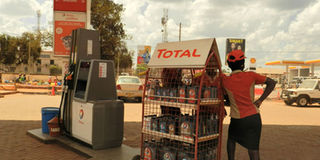Total, dealers clash over profit sharing

Challenged. A Total worker waits for customers at a fuel filling station in Gulu Town. Some dealers have challenged Total for introducing a new few that requires a 50/50 profit sharing. PHOTO BY TOBBIAS JOLLY OWINY
What you need to know:
The new profit share requirement will see dealers transfer 50 per cent of their profits to Total while the 50 per cent is retained by the dealer.
Plans by Total to have its fuel retailers shoulder the cost of upgrade and expanding filling stations has sparked protests with some retailers, saying the move is unfair and eats into their profits.
In a November 19, 2018 letter seen by Daily Monitor, Mr Imemba Obi, the Total managing director, announced a new fee (station optimisation fees), requiring retailers to share half of their profits with the company.
Mr Obi, according to the letter, said the profit sharing move was intended to enable Total meet costs of upgrade and expansion being conducted across the country.
“To sustain these investments, we [Total] need to share the increased value created on the network, hence the introduction of station optimisation fees,” the letter reads in part.
Mr Obi on Tuesday acknowledged writing the letter, emphasising that the fee had already been implemented.
However, he declined to comment on the dealers protesting the fee, saying the implementation was not directly under him.
“I cannot discuss those details or concerns with you because there is a specific manager who handles that,” he said, suggesting a meeting with the manager.
However, the meeting was yet to take place by press time.
Mr Timothy Jokene, who had operated a Total filling station for 30 years in Gulu Town, in February clashed with the company, saying the fee was arbitrarily introduced without consulting dealers. “They never negotiated with us. They just gave directives and they wanted things implemented their way. I only get Shs70 as profit from each litre of fuel I sell and what do I remain with if they [Total] take away 50 per cent of that?” he wondered, adding that if Total wants to expand it should not shift the cost burden to dealers.
Mr Jokene, who declined to abide by the new requirement has since been kicked out the filling station on the pretext that his agreement with Total expired.
In a January 7 letter, Mr Obi informed Mr Jokene that his agreement with Total would expire on February 10 and would not be renewed.
“Be at the station on February 11 to hand over the station to your retail territory executive,” Mr Obi wrote in a letter.
Other dealers, who spoke to Daily Monitor on condition of anonymity for fear of being victimised, said the fees have eaten into their profits, which has made fuel retailing extremely expensive.
Total is currently working on a countrywide expansion and modernisation plan through which it has re-branded and expanded some of its filling stations and installed new product lines.
Dr Kiiza Besigye, a political activist and a Total fuel dealer in Kampala, blamed government for the weak regulations that have left consumers at the mercy of foreign companies.
“The lack of regulations leaves not only the dealers vulnerable but even the consumers. I know many dealers will opt out of the business,” he told Daily Monitor in Gulu last week.
How profits are shared
The new profit share requirement will see dealers transfer 50 per cent of their profits to Total while the 50 per cent is retained by the dealer. According to Mr Timothy Jokene, who had operated a Total filling station for 30 years in Gulu Town before he was kicked out recently, a dealer on average earns Shs70 in profits on each litre of fuel sold. The new requirement also demands that new dealers will have a 70 per cent (Total)-30 per cent (for new dealers) share structure. This is a shift away from the 28 per cent (Total)-50 per cent (new dealer) share structure that Total had previously been using.



